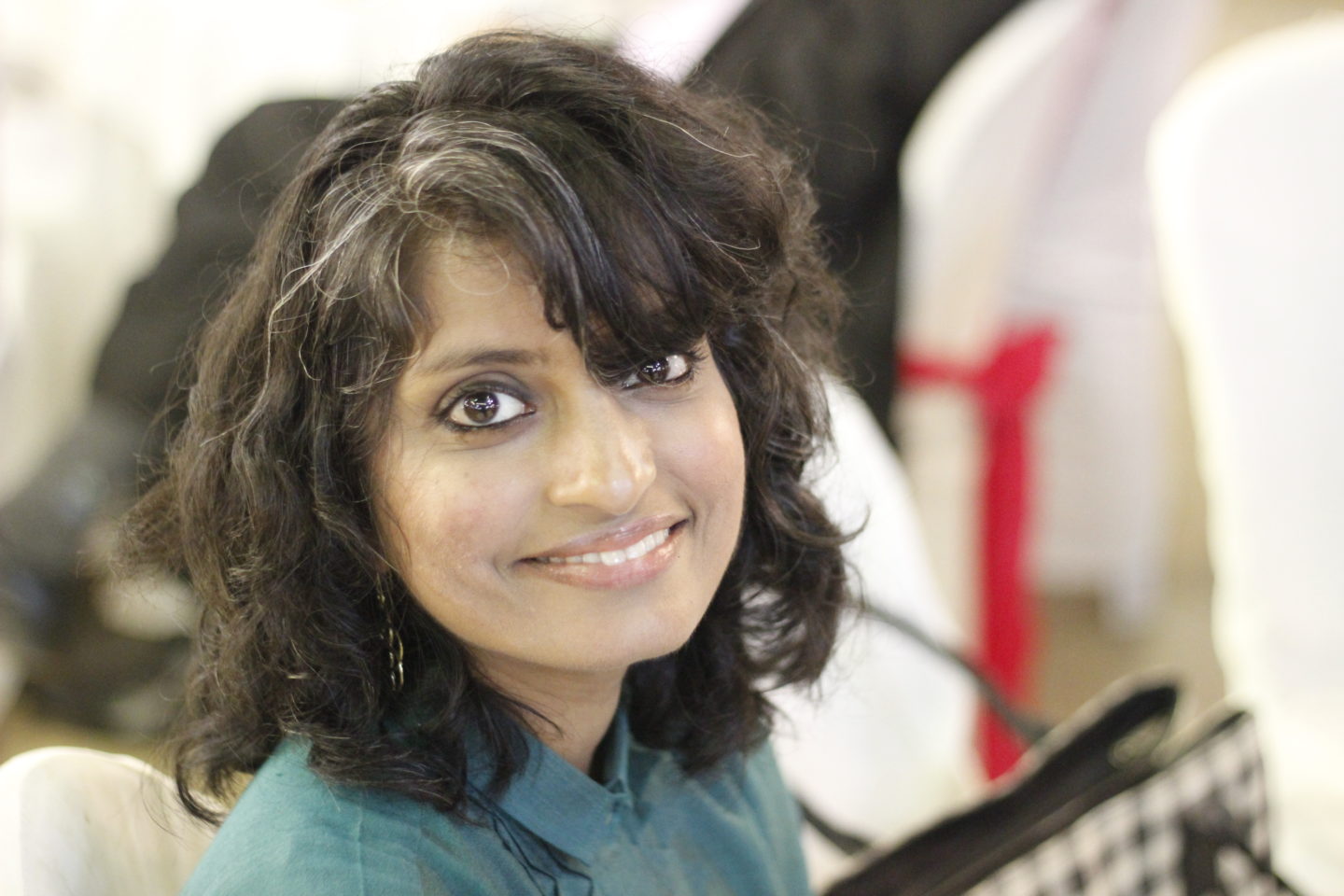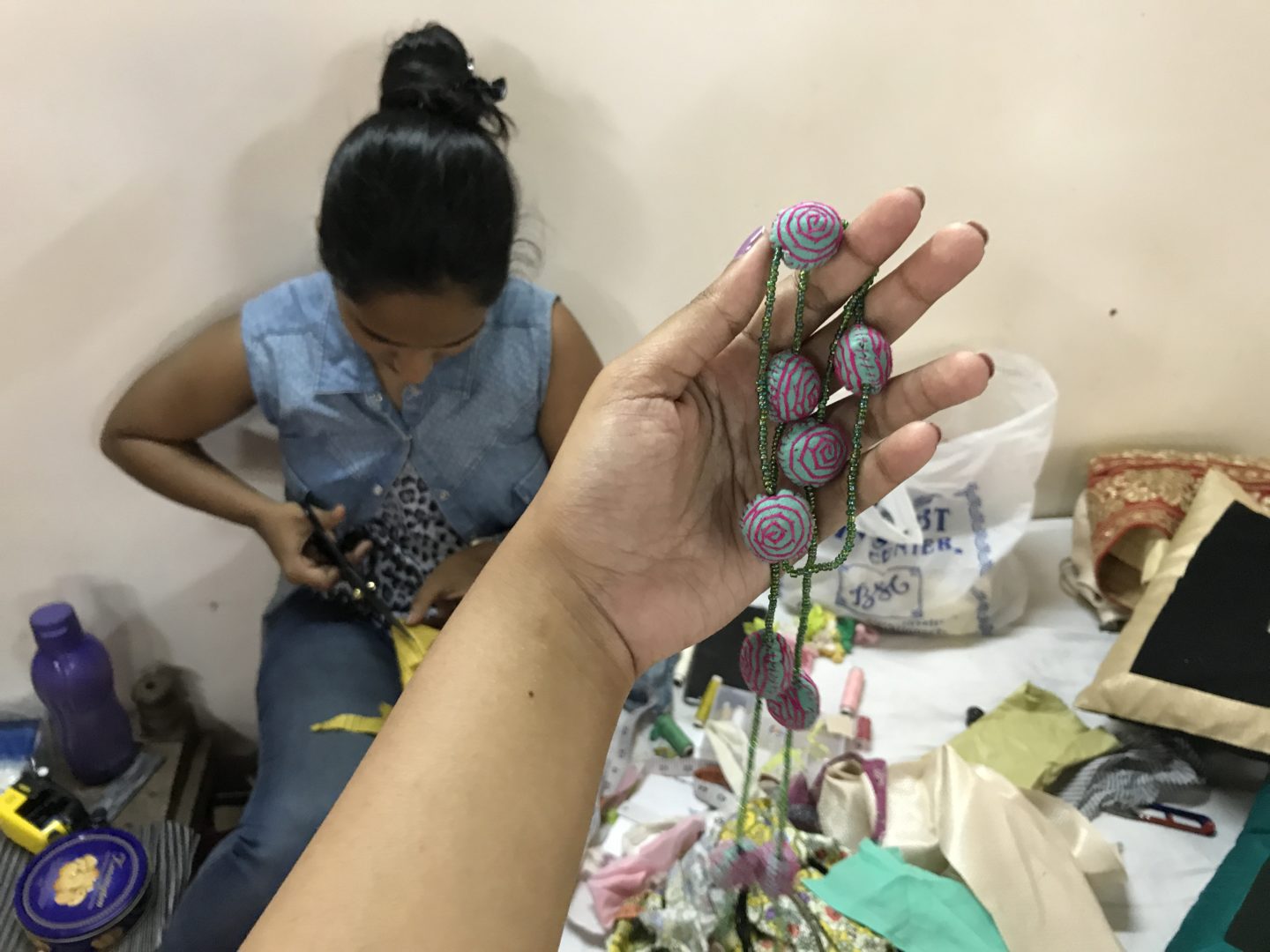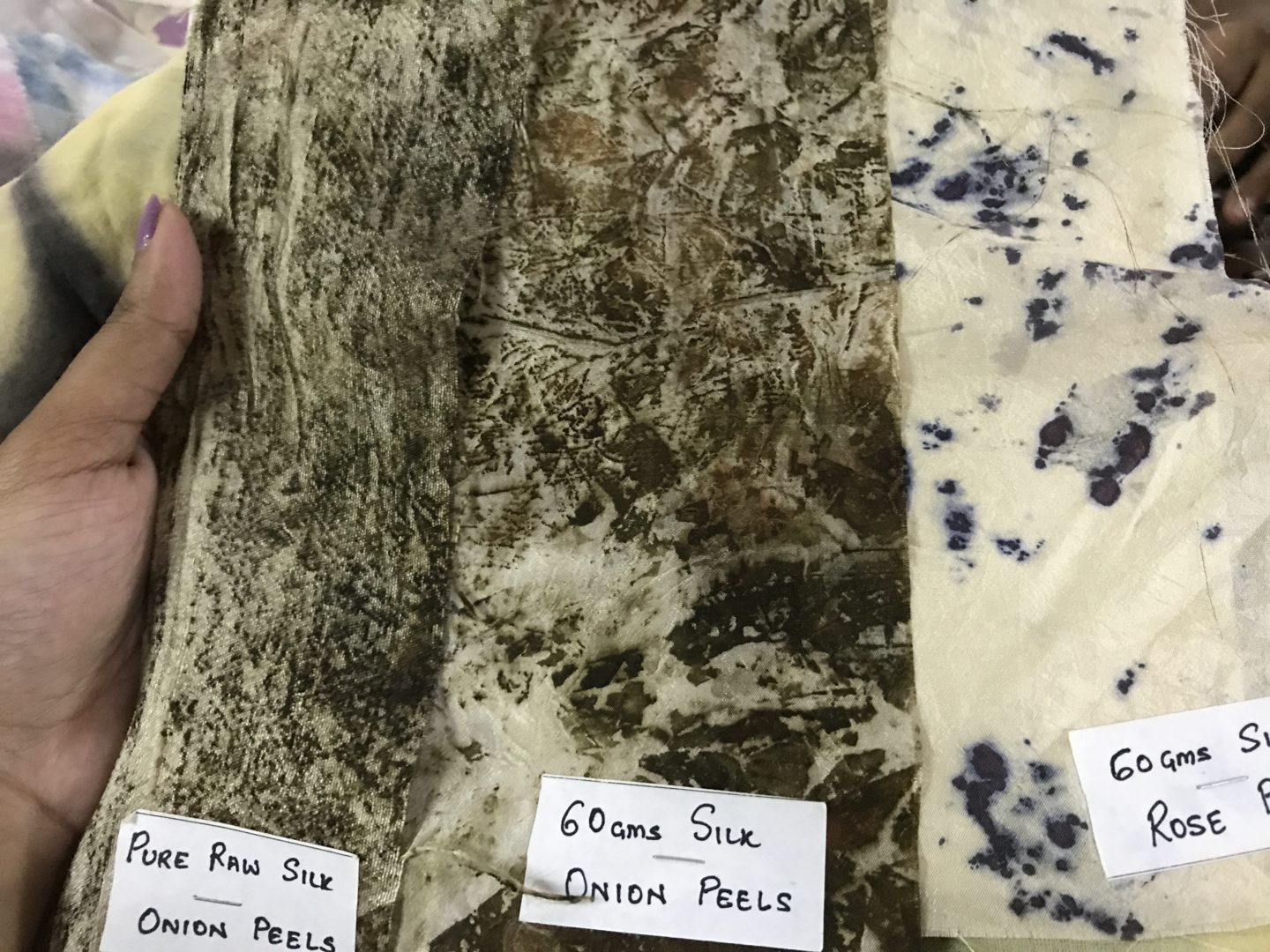Goa-based fashion designer Ninoshka Alvares-Delaney is one to watch! This fashion pioneer from Saligao is in the organic fashion space and was recently honored by the Union Minister of State for textile, Smriti Irani from over 1660 designers across the country for her unique use of eco-friendly products, handloom fabrics and dyes. In a state that’s always equated fashion with Wendell Rodricks, quiet, graceful Ninoshka is slowly but surely getting the attention she deserves.

About Ninoskha
Apart from the fact that she lives a few minutes away from my home in Saligao, we also have two people in common – her sister, my classmate – Kim, and a professor we both admired in our respective colleges – Rajesh Nambiar who taught Ninoshka during her NIFT days and years later, taught me in a subject in MBA. Strangely, the two of us had never met long enough to have a conversation until my trip to Goa last week when I visited her workshop.
I walked around the Delaneys’ house to the back and through their garage till I found myself at their little office in the backyard that was buzzing with activity. A few minutes later, she led me upstairs to a much quieter, spacious room that had two tailors at work on sewing machines and another making necklaces out of fabric that anyone else would have discarded without a second thought.

We’re both reluctant conversation starters, but it wasn’t long before I’m poring over fabric that’s been printed with… of all things… onion peels!! The fabric and print look so delicate that it feels as if touching it would wipe the patterns away like powder, but Ninoshka tells me that the fabric is just like any other – can be washed, dried, and worn like normal. How cool is that!

Ninoshka explains to me the whole process of how she managed to accomplish something so oddly brilliant and then opens out rolls of fabric that have been dyed with pomegranate, marigold, rose, indigo, and pigments given out by beetles!
The label crafts elegantly tailored business, evening and casual fashion made of high-quality, sustainable and certified materials. In fact, the brand uses a label that’s trademarked to the India Handloom Brand, meaning the quality of the materials she uses has been tested for a period of 6 months before being trademarked. Why is this important? Because handmade fabric is prone to human error and Ninoshka finds that having her fabrics certified beforehand saves a lot of hassles later on.
I didn’t ask her about what sparked her interest in fashion, her philosophy and all the accolades she’s won, because it’s all available on the internet. Here’s what our neighbourly conversation was like:
What is your personal style?
When it comes to my personal clothing preference, I’ve always opted for organic clothing. Synthetic fabric never appealed to me and I never felt comfortable in them. For me, comfort is paramount and what I others think of my attire comes second. Even when it comes to my hair, I don’t colour it or attempt to hide my greys. I let it be as it is – natural. It may be greying, but that’s something that everyone goes through. Why hide it?
What’s it like running a business like yours with a child?
It’s very tough managing a business with a child. Before Daniel was born, the business was slow and I was happy at the pace it was going. For a year after he was born, it was stagnant and slowed. It’s now that he’s started going to school that I’ve decided to buck up and achieve what I want to. I have a few hours while he’s at school to do the bulk of my work. I won a couple of awards this year that quickened my growth, so that helped too!
How do you manage creativity with commerce at Ninoshka?
I don’t like getting involved in money and sales. It stifles my creativity and takes up too much of my time. If I think about sales and price tags, my mind is occupied with thinking about what designs will sell and what won’t. So I’ve left the marketing and sales up to my husband so that all my thoughts and energy go into creating the best designs possible.
I’ve read that artisans are your biggest inspiration. Why is that?
Artisans are so content with what they have. If we have a mobile phone, we always want a better one. We want a car. We want more luxury. But I’ve worked with these people and I see how content they are with their lives. They think like children and aren’t influenced by the outside world.
At one point, I worked with artisans in Gujarat and we had the theme ‘sky, water and earth.’ One lady embroidered a circle with fish inside, and when asked what it was, she said it was well outside her home with fish swimming inside. Another person created something and I couldn’t quite fathom what it was. He later told me that it was a constellation in the sky.
All these things exist around us, but we don’t notice and aren’t inspired by them. Our thoughts are so complex and influenced by so many things. That’s why I aspire to be like those artisans.
Goans love to dress up in their finest gowns for feasts and weddings. Since you only wear organic clothes, do you find it odd to wear simple, understated clothes on such occasions?
Not really. For occasions that need formal or showy attire, I pick linen or silk garments instead of cotton. I once wore a linen skirt and organic white shirt for someone’s 50th wedding anniversary – and you know what huge occasions those are! Golden jubilees are even grander than the wedding itself! Everyone was in their beaded, shimmery clothing and I was the complete opposite. I was surprised to have got a lot of compliments that night – and even 3 orders for the skirt I was wearing!
I think Saligao is still more open-minded and accepting of organic clothing. When it comes to the south and the coastal belt, you will find that for formal occasions, everyone looks identical. All the women wear the same, tailor made suit-skirt set or a top and skirt made from the same fabric. It will have some small differences like beads or embroidery but other than that, it all looks mass produced.
Tell me more about your attempts to revive the Adivasi weave in Goa
My husband and I are working on marketing the Adivasi weave in Goa. We are helping Dr Rohit, a historian to market the weave which is presently being made in Karnataka, as there are no weavers left in Goa. however, our aim is to get the weaving industry started in Goa again with the support of the textile ministry.
The Kunbis are aboriginals of Goa and wore the Adivasi Sari, also called ‘kaapad.’ Their way of draping the sari was basic, called ‘Detli’ and involved wrapping the sari around the waist and typing it over the right shoulder in a knot. This style of draping facilitated fieldwork. The sari ended just above the ankle and did not need a blouse or petticoat, although younger women did use blouses with puff sleeves. A white shawl called ‘voll’ was thrown over the shoulder and the pallu was tucked in at the back to form a pocket of sorts.
This weave was compact and made in Goa on handlooms but with the decline of handlooms, the weave stopped in 1985. It is one of our endeavors to get the original Adivasi weave revived here in Goa.
Which celebrity’s personal style do you admire?
I love the way Kiran Rao dresses. She’s always comfortable in sarees and kurtas. In Hollywood, they’re all well-dressed, but I like Emma Watson’s style the most.
Where can one buy from the Ninoshka label?
We’re available online on sites like Jaypore, Bunosilo, and Peacock Colours along with a handful of retail stores..
—-
It’s always a pleasure meeting people who enjoy doing what they love and whose benefit to society is their biggest satisfaction. Ninoshka’s philosophy of ‘fashion with a conscience’ is refreshing, to say the least, and just goes to show that the future is definitely hand-made!
That wrapped up my chat with Ninoshka Alvares- Delaney! If you enjoyed this one, don’t forget to subscribe!!
Let me know what you think and keep in touch on Facebook, Twitter, and Instagram!
Bye!